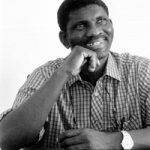Gladman Ngubo

Gladman Ngubo, also known by the name Mvukuzane, was born in Durban in Cato Manor (Mkhumbane) the place of stokvels and Marabi music, but grew up in his rural home at Umzimkhulu. Whilst working in Durban he became a trade unionist where his leadership qualities quickly emerged and he was elected as a shop steward. His talent as a writer and a praise poet was soon discovered when he recited at trade union meetings and rallies.
In 1987 he joined the Congress of South African Writers (COSAW). In 1988 he was elected to serve in COSAW’s Provincial Executive structure in KwaZulu-Natal where he earned respect because of his passion for developing writers from previously disadvantaged communities.
In part, these factors influenced the decision to elect him as representative to the Zabalaza Festival that was held in London in 1990. In 1991, he completed a diploma course in Cultural Work (1990-1991), organised by The Culture and Working Life Project at the University of Natal and in 1993 he obtained a Community Development Certificate also at the University of Natal. In 1993, he was employed as a Project Co-ordinator of the Natal Youth Publishing Project (NYPP), publishers of Realtime Magazine. In 1994, Ngubo was a finalist of the Bertram’s V.0. Literature Award, and in 1995, was chosen as Writer of Merit in the same competition. Other career highlights include being a marketer for Y Press’s Outcomes-based Education (OBE) books to schools in KwaZulu-Natal and being a part-time Zulu translator and editor for DRUM Magazine. In 2001, he was employed by DRUM Magazine on contract as Development Officer in KwaZulu-Natal. In 2002, when the DRUM offices relocated to Johannesburg, he was employed by Media 24 to be its representative in KwaZulu-Natal. Gladman Ngubo was also co-ordinator of Poetry and Language Development, a project of the Durban Arts Association. He has acted as CEO of Durban Arts Association.
Bibliograpy
1991. The Man Who Could Fly and Other Stories and Poems. Durban: Culture and Working Life Project.
1996. Amandl’Esam bane. Durban: Y Press.
1998. Yekantni Ulzuzenza. Cape Town: Kwela Books.
2003: Kazi Ikusas Lisiphatheleni. Durban: Solo Collective.
In part, these factors influenced the decision to elect him as representative to the Zabalaza Festival that was held in London in 1990. In 1991, he completed a diploma course in Cultural Work (1990-1991), organised by The Culture and Working Life Project at the University of Natal and in 1993 he obtained a Community Development Certificate also at the University of Natal. In 1993, he was employed as a Project Co-ordinator of the Natal Youth Publishing Project (NYPP), publishers of Realtime Magazine. In 1994, Ngubo was a finalist of the Bertram’s V.0. Literature Award, and in 1995, was chosen as Writer of Merit in the same competition. Other career highlights include being a marketer for Y Press’s Outcomes-based Education (OBE) books to schools in KwaZulu-Natal and being a part-time Zulu translator and editor for DRUM Magazine. In 2001, he was employed by DRUM Magazine on contract as Development Officer in KwaZulu-Natal. In 2002, when the DRUM offices relocated to Johannesburg, he was employed by Media 24 to be its representative in KwaZulu-Natal. Gladman Ngubo was also co-ordinator of Poetry and Language Development, a project of the Durban Arts Association. He has acted as CEO of Durban Arts Association.
Bibliograpy
1991. The Man Who Could Fly and Other Stories and Poems. Durban: Culture and Working Life Project.
1996. Amandl’Esam bane. Durban: Y Press.
1998. Yekantni Ulzuzenza. Cape Town: Kwela Books.
2003: Kazi Ikusas Lisiphatheleni. Durban: Solo Collective.